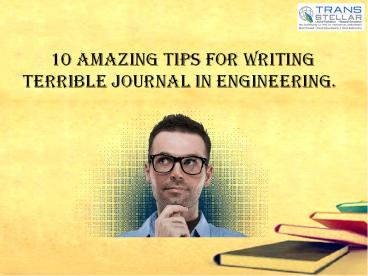10 AMAZING TIPS FOR WRITING TERRIBLE JOURNAL IN ENGINEERING. - PowerPoint PPT Presentation
Title:
10 AMAZING TIPS FOR WRITING TERRIBLE JOURNAL IN ENGINEERING.
Description:
we are one of the leading national and international journal publishers and distributors of our research journals and serve more than 10 million scientists, research scholars, educational institutions, governmental bodies, corporate, scientific and engineering librarie – PowerPoint PPT presentation
Number of Views:48
Title: 10 AMAZING TIPS FOR WRITING TERRIBLE JOURNAL IN ENGINEERING.
1
10 AMAZING TIPS FOR WRITING TERRIBLE JOURNAL IN
ENGINEERING.
2
Step1
Refuse to read the previous literature published
in your field
- Literature study is the essential starting point
of any worthy research activity. - Publication pressure is not a valid excuse for an
incomplete literature review. - This is a process taking months, often years.
- study and not if you discriminate based on
reading of titles and abstracts only.
3
Step2
Take the lazy route and plagiarize
- Plagiarism is a serious breach of publishing
ethics and in some cases may also be copyright
infringement. - Plagiarism, no matter how small, and no matter
how old the documents being plagiarized, is a
very effective route to academic self-destruction.
4
step3
Omit key article components
- Summary of the state of the art Identification of
knowledge gap - Specification of novelty/objectives/scope of the
present research work - Applied research methodology
- Obtained results
- Conclusions
5
step4
Disrespect previous publications
- Respect is of the utmost importance in scientific
research and academic publishing. - Generally, much research work has been done
before, carefully reported in high-quality
journal articles, conference articles and
reports. - You can also show disrespect by overestimating
the importance or novelty of your own contribution
6
step5
Overestimate your contribution
- it is much easier to identify deficiencies in
others work than in your own. - This does not mean that your work is better it
just means that you need to critically
self-reflect on the deficiencies of your own
work. - a very small link in the long chain of
incremental knowledge advancement in a tiny
subfield of science.
7
step6
Excel in ambiguity and inconsistency
- Try to make the interested reader clueless about
what you are communicating - by introducing ambiguity in your sentences and
words. - Another effective approach is inconsistency in
terminology - use different terms - A scientific article is not a novel. Reader
interpretation is not welcomed and means the
writer has failed.
8
step7
Apply incorrect referencing of statements
- Unless explicitly stated otherwise every
statement in a scientific article should be
immediately backed up by a suitable reference or
by evidence reported in your article. - Adding references where not needed and even
worse not adding references where needed is
bound to lead to confusion and misinterpretation
of your statements.
9
Step8
Prefer subjective over objective statements
- Statements in a scientific article are intended
to communicate knowledge and information. - Good communication demands unambiguity,
consistency and objectivity. - Irrespective of the adjective, providing this
type of subjective statement is not only
imprecise and inappropriate but also creates a
straight path to disagreement with reviewers and
readers.
10
Step9
Give little care to grammar, spelling, figures
and tables
- Youve already put in so much hard work, why
spend time focusing on the correct use of grammar
and spelling? - Reviewers or typesetters will correct that,
right? Careful figure legends, axis indications,
units - The fastest way to lose the confidence of the
editor, reviewers and readers in your work is to
follow this tip.
11
Step10
Ignore editor and reviewer comments
- The editor and reviewers represent your future
readers and theyve raised these points for a
reason. - You would be wise to listen to them.
12
www.tjprc.org
Call us 9841018718































